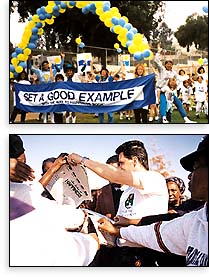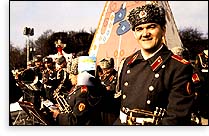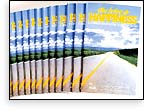

The Way to Happiness
spawned spawned grass-roots
campaigns based on the
principles contained in
the booklet, such as the
“Set A Good Example”
campaign and teams who
produced and distributed
newsletters containing portions
of the booklet in areas of
South Africa torn by
civil unrest.


erhaps the first non-religious moral code based purely on common sense, The Way to Happiness by
The grass-roots demand for this booklet is worldwide, and the precepts are applied by tens of millions around the planet, by men, women and children from every conceivable station in life — from Moscow police officers to convicts serving life sentences in San Quentin, from schoolchildren in Zimbabwe and Beverly Hills to heads of state. It applies to any person’s life, anywhere.
The Way to Happiness is available as an extension course for those who wish to study it with guidance. It is this extension course format that is used by prisoners in the Criminon Program. As an early step in their overall program, they study the booklet to gain a personal understanding of right and wrong conduct. With a personal moral code of their own that they understand and can use, prisoners can turn themselves around and build productive lives based on honesty and self-respect.
In The Way to Happiness is a detailed description of each precept, including how it works and how to apply it in life. Rather than just a set of rules or “do’s and don’ts,” The Way to Happiness provides actual insight and shows how each precept can be put to practical use.
The 21 precepts are as follows:
- Take Care of Yourself
- Be Temperate
- Don’t Be Promiscuous
- Love and Help Children
- Honor and Help Your Parents
- Set a Good Example
- Seek to Live With the Truth
- Do Not Murder
- Don’t Do Anything Illegal
- Support a Government Designed and Run for All the People
- Do Not Harm a Person of Good Will
- Safeguard and Improve Your Environment
- Do Not Steal
- Be Worthy of Trust
- Fulfill Your Obligations
- Be Industrious
- Be Competent
- Respect the Religious Beliefs of Others
- Try Not to Do Things to Others That You Would Not Like Them to Do to You
- Try to Treat Others As You Would Want Them to Treat You
- Flourish and Prosper
One example of the 21 precepts for successful living in a modern world, Precept 9, “Don’t Do Anything Illegal,” is included here in its entirety as especially appropriate for this issue of Freedom:
“Illegal acts” are those which are prohibited by official rules or law. They are the product of rulers, legislative bodies and judges. They are usually written down in law codes.
In a well-ordered society, these are published and made known generally. In a cloudy — and often crime-ridden — society one has to consult an attorney or be specially trained to know them all; such a society will tell one that “ignorance is no excuse for breaking the law.”
Any member of society, however, has a responsibility, whether young or old, for knowing what that society considers to be an “illegal act.” People can be asked, libraries exist where they can be looked up.
An “illegal act” is not disobedience to some casual order like “go to bed.” It is an action which, if done, can result in punishment by the courts and state: being pilloried by the state propaganda machine, being fined and even by being imprisoned.

| ||
 |
Members of the police force in Russia have used and distributed The Way to Happiness to promote moral values and reduce crime. |  |
When one does something illegal, small or large, one is laid open to an attack by the state. It does not matter whether one is caught or not, when one does an illegal act, one has weakened one’s defenses.
Almost any worthwhile thing one is trying to accomplish often can be done in perfectly legal ways. The “illegal” route is a dangerous and time-wasting shortcut. Imagined “advantages” in committing illegal acts usually turn out not to be worth it.
The state and government tends to be a rather unthinking machine. It exists and works on laws and codes of laws. It is geared to strike down through its channels at illegality. As such it can be an implacable enemy; adamant on the subject of “illegal acts.” The rightness and wrongness of things do not count in the face of laws and codes of laws. Only the laws count.
When you realize or discover that those about you are committing “illegal acts,” you should do what you can to discourage it. You yourself, not even a party to it, can yet suffer because of it. The firm’s accountant falsifies the books: in any resulting commotion, the firm could fail and you could lose your job. Such instances can grossly affect one’s survival.
As a member of any group subject to laws, encourage the clear-cut publication of those laws so they can be known. Support any legal, political effort to reduce, clarify and codify the laws that apply to that group.
Adhere to the principle that all men are equal under law: a principle which, in its own time and place — the tyrannical days of aristocracy — was one of the greatest social advances in human history and should not be lost sight of.
See that children and people become informed of what is “legal” and what is “illegal” and make it known, if by as little as a frown, that you do not approve of “illegal acts.”
Those who commit them, even when they “get away with them,” are yet weakened before the might of the state.
The way to happiness does not include the fear of being found out.
Each of the 21 precepts is covered in this manner, so they can be understood and used by anyone. More than 51 million booklets have been distributed. They are in widespread use everywhere from public schools in the United States to peace officers in South Africa. The Way to Happiness is a tool which can help anybody who wants to lead a better, happier life.

| ||
 |
For a copy of The Way to Happiness, write to The Way to Happiness Foundation, 6324 Sunset Boulevard, Los Angeles, CA 90028. Telephone: (323) 962-7906 or (800) 255-7906. |
 |

